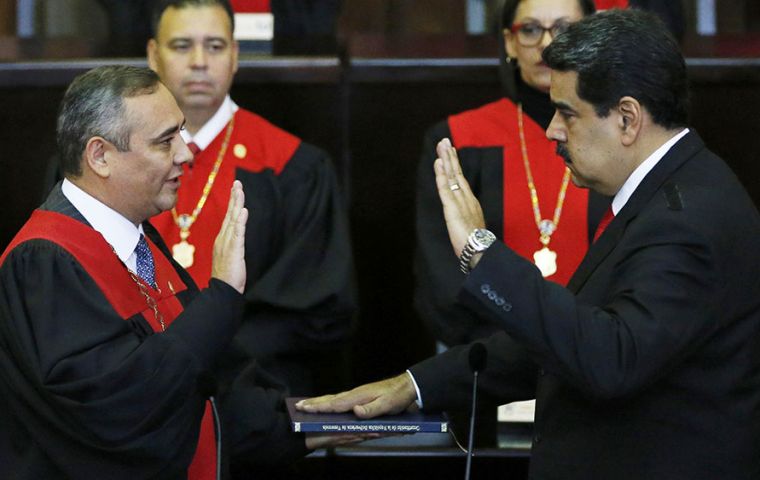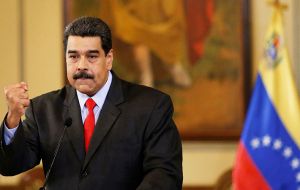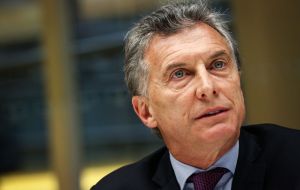MercoPress. South Atlantic News Agency
Maduro sworn as president but most of the Americas reject his legitimacy
 Only Cuba's Miguel Diaz-Canel, Bolivia's Evo Morales and president Anatoli Bibilov of a Georgia breakaway province among the few attended the ceremony
Only Cuba's Miguel Diaz-Canel, Bolivia's Evo Morales and president Anatoli Bibilov of a Georgia breakaway province among the few attended the ceremony  “Venezuela is the centre of a world war led by the North American imperialists and its allies,” said Maduro, a former bus driver
“Venezuela is the centre of a world war led by the North American imperialists and its allies,” said Maduro, a former bus driver  “Nicolas Maduro today is making a mockery of democracy,” Macri said on Twitter. “Venezuelans know it, the world knows it. Venezuela lives under a dictatorship.”
“Nicolas Maduro today is making a mockery of democracy,” Macri said on Twitter. “Venezuelans know it, the world knows it. Venezuela lives under a dictatorship.” Venezuelan President Nicolas Maduro was sworn into a second term on Thursday amid international calls for him to step down, a devastating economic crisis and growing diplomatic isolation.
Seventeen Latin American governments, the United States and Canada rejected the legitimacy of Maduro's next term in a measure adopted on Thursday. Most countries from Europe and Latin America didn't send representatives to the swearing-in.
But Cuba's President Miguel Diaz-Canel, Bolivian President Evo Morales and President Anatoli Bibilov of a breakaway province of Georgia were among the few foreign leaders who attended the ceremony at the country's Supreme Court.
In a speech after his swearing-in, Maduro claimed 94 countries had sent representatives to his inauguration. He vowed to continue the legacy of the late President Hugo Chavez and accused the United States of trying to ignite unrest through its increasing economic sanctions.
“Venezuela is the centre of a world war led by the North American imperialists and its allies,” said Maduro, a former bus driver. “They have tried to convert a normal inauguration into a world war.”
Maduro's second term extends Venezuela's socialist revolution amid widespread complaints that he has stripped the country of its last vestiges of democracy.
Maduro, 56, denies that he's a dictator and blames the United States presidents, the latest of which, Donald Trump for leading an economic war against Venezuela that's destroying the country.
The Organization of American States voted not to recognize Maduro's legitimacy, adopting a resolution presented by Colombia, Argentina, Brazil, Chile, Costa Rica, the United States, Paraguay, and Peru. The move was denounced by Venezuela's ambassador to the OAS, Samuel Moncada, as “a hostile act... against the will of our nation”.
Paraguay went a step further, cutting diplomatic ties. President Mario Abdo Benitez said his country “in the exercise of its constitutional powers and national sovereignty, adopts the decision to break diplomatic relations with the Bolivarian Republic of Venezuela”.
US Secretary of State Mike Pompeo said in a statement that the United States will keep up pressure in support of the Venezuelan people.
“It is time for Venezuelan leaders to make a choice,” Pompeo said, urging Maduro supporters to be on the right side of history. “Now is the time to convince the Maduro dictatorship that the moment has arrived for democracy to return to Venezuela.”
Argentina's President Mauricio Macri also denounced Maduro, saying he lacks the authenticity won through honest elections despite the elaborate inauguration ceremony and any other “tricks”.
“Nicolas Maduro today is making a mockery of democracy,” Macri said on Twitter. “Venezuelans know it, the world knows it. Venezuela lives under a dictatorship.”
Oil-rich Venezuela was once among Latin America's wealthiest nations. It produced 3.5 million barrels of crude daily when Chavez took power. Output now has plummeted to less than a third of that. Critics blame years of rampant corruption and mismanagement of the State-run oil firm PDVSA.
The economic collapse has left the nation of roughly 30 million in the throes of a historic crisis. An estimated 2.3 million Venezuelans have fled their nation's hyperinflation, food and medical shortages over the last two years, according to the United Nations. Those remaining live on a monthly minimum wage equal to less than US$5 and falling daily.
Venezuela's splintered opposition movement has failed to counter the socialist party's dominance. Maduro's government has jailed or driven into exile its most popular leaders.
In May, Maduro declared victory in a presidential election that his political opponents and many foreign nations consider illegitimate because popular opponents were banned from running and the largest anti-government parties boycotted the race.
The Opposition-led Congress opened its session for the year this week, led by 35-year-old Juan Guaido, who vowed to battle against Maduro. Guaido said Maduro is “usurping the presidency”.
“Today there is no head of state. Today there is no commander-in-chief,” said Guaido, adding that Maduro kidnapped Venezuela for his own benefit.
The Trump Administration has increased pressure on Maduro through financial sanctions, this week singling out powerful Venezuelan media magnate Raul Gorrin. US banks are also banned from doing business with Venezuela, putting a financial strangle-hold on the cash-strapped country.
David Smilde, Tulane University expert on Venezuela, said that this isn't likely to create change. Ultimately, Maduro's Government isn't worried about its international reputation, he said. “He still has control of the institutions,” Smilde said. “He has the guns. He has the money.”
While Maduro's popularity has plunged amid scarcities, hyperinflation and rising authoritarianism that have sparked a mass emigration, supporters who receive government subsidies in shantytowns continue to back the man who took over from Chavez.




Top Comments
Disclaimer & comment rules-

-

-

Read all commentsPatrick
Jan 11th, 2019 - 08:27 pm +2“...Why don't we help these countries like Venezuela and Cuba in the path they chose to take...”
I absolutely agree with you. Any invading nation overthrowing the corrupt Marxist mismanaged Venezuela would be enthusiastically cheered by the masses, but no one wants to waste their blood and treasure.
To paraphrase Shakespeare, “...first thing we do is kill all the [Marxists]”
Lots of Venezuelans are happily willing to do that now... *
(* Social Justice Warrior trigger alert: I personally do not advocate the physical harm of any Marxists. I think instead they should be given forced exile in the Socialist paradise of Cuba.)
The history books will be printed with a chapter beginning: “Then, in 1998, a charismatic strongman named Hugo Chavez was elected president. Chavez appealed to Venezuela's poor by promising to rescue them from poverty and to restore the country's pride.” A similar Marxist story repeated many times which all end up not very nicely in history books.
Jan 11th, 2019 - 02:55 pm +1You are nothing but a drug induced whackjob. Lover Peron? Get ready for a pretty tough future...
Jan 13th, 2019 - 03:20 am +1Commenting for this story is now closed.
If you have a Facebook account, become a fan and comment on our Facebook Page!